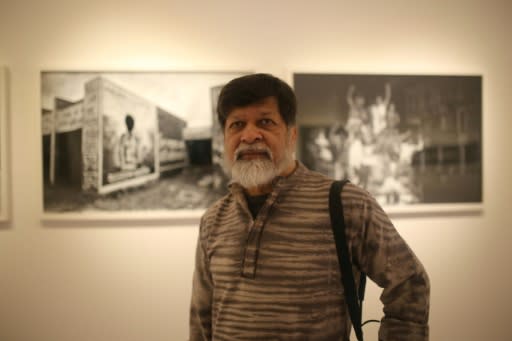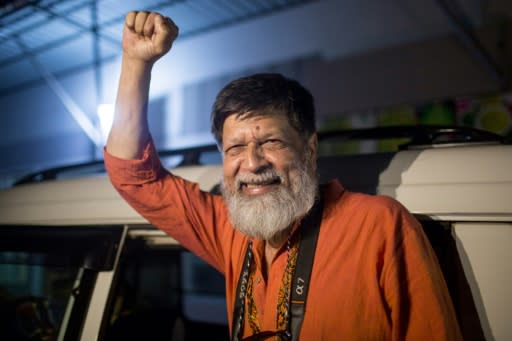Top dissident warns Bangladesh at 'critical juncture'
Fresh from jail for dissent, and celebrated by Time magazine for fearless journalism, Shahidul Alam is not hiding as his native Bangladesh approaches an election he fears could be rigged. More than 100 million voters are registered for the December 30 poll in the South Asia nation -- one of the world's largest democratic exercises. But Alam, an award-winning photojournalist and activist, says a climate of fear gripping Bangladesh could keep many away from the ballot box and encourage self-censorship by the country's browbeaten free press. "I hope for a free and fair election," he told AFP in an interview in Dhaka. "But I am pretty certain that is not how it is going to be, based on how things are shaping up." The opposition says its candidates have been disqualified and supporters jailed in a pre-election crackdown, and political rallies turned violent almost as soon as campaigning began. Prime Minister Sheikh Hasina, who is seeking a third-straight term, has been accused of intolerance to dissent and creeping authoritarianism in her nearly decade in power. Alam, who this week was named one of Time magazine's "Persons of the Year" alongside other free-press champions, is no stranger to falling foul of her rule. In August, in a television interview, Alam criticised the government's handling of major student rallies that were gripping Bangladesh. He was arrested in a midnight raid on his home and charged with making "false" and "provocative" statements -- offences carrying a maximum 14 years in jail. Hasina publicly derided the internationally renowned photographer as "mentally sick". "I hope this sickness is something that is contagious, that many other people become sick like me and come out and speak the truth," Alam said. His detention sparked global outrage and became a closely watched freedom of speech case. Alam, 63, says he was beaten in custody so badly his tunic needed washing before he appeared in court. There, in a defiant show of force, he raised his fist for the waiting cameras. "I was hit. I was blindfolded. I was handcuffed. I was threatened with waterboarding", he told AFP of his stretch behind bars. Police have denied assaulting Alam in custody. - 'Let people speak' - After 108 days, he was released from prison in late November on bail. But despite his torment, and facing serious jail time, Alam has refused to bow down as the election looms, warning Bangladesh is at a "critical juncture". Hasina was elected unchallenged in 2014 after the Bangladesh Nationalist Party boycotted the vote, alleging it was rigged. This time around the BNP, the main opposition party, is contesting the poll but without its leader Khaleda Zia, Hasina's chief rival and twice Bangladesh's prime minister. Zia is behind bars on corruption charges her supporters say were politically motivated to keep her out of the race. The opposition is yet is yet to nominate a challenger to Hasina, with other key figures in exile or also languishing in prison. "The opposition is being arrested in hordes," Alam said. "That does not bode well. It does not indicate the genuine intention of holding a free and fair election." To compound matters, Bangladesh media was unwilling to "talk about things that are really happening" in the nation of 160 million along the Bay of Bengal, fearing retaliation. Rights groups have accused Hasina of stifling dissent by wielding draconian laws to curb free speech, and using police and the courts to cow opponents Alam said it was vital Bangladesh, and its democratic champions, did not lose sight of what was at stake and kept up the fight in the coming weeks. "We live in a free country, supposedly. Why not let people speak their will?" he said. "It is time for me and everyone else to ensure a free, fair and participatory election takes place. And all of us should do everything in our power to ensure that happens." Shahidul Alam, an award-winning photojournalist, says a climate of fear is gripping Bangladesh Alam was arrested after he criticised the Bangladesh government's handling of major student rallies Alam's detention sparked global outrage and became a closely watched freedom of speech case Rights groups have accused Bangladesh PM Sheikh Hasina of stifling dissent by wielding draconian laws





